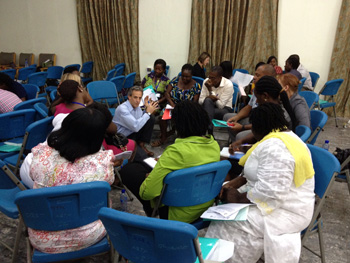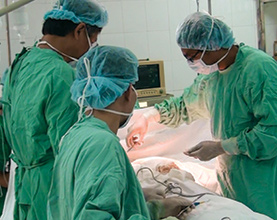Feb 26, 2013
ASCO International is expanding its efforts to address the growing global cancer burden and care disparities
Since its establishment in 1964, ASCO has taken deliberate steps to help to bridge the gap in health equity among different racial and economic groups in cancer prevention, diagnosis, and treatment, regardless of geography. The Society is now a global community of cancer care providers in more than 100 countries worldwide.
 |
|||
| Dr. Michael Fisch (center) of MD Anderson discusses palliative care with doctors and nurses in Accra, Ghana. | |||
Building on this legacy and its extensive global expertise, ASCO recently launched ASCO International—a new and ambitious commitment to a portfolio of programs and research opportunities that will accelerate collaboration between members, organizations, and countries with the goal of maximizing chances of survival for every patient with cancer in the world. In pursuit of this goal, ASCO International commits to doubling its international programs over the next four years.
A key proponent of the Society's expanded international initiative is ASCO President Sandra M. Swain, MD, FACP, whose presidential theme, "Building Bridges to Conquer Cancer," encompasses the issue of global inequities in cancer care. "ASCO International really takes ASCO's long-standing commitment to work with members around the world to the next level. We can improve patient care today by training clinicians in cancer care and assisting hospitals and cancer centers; we can improve patient care tomorrow by mentoring future oncology leaders in developing countries and funding innovative research," said Dr. Swain.
Urgent need
This strategic initiative could not have come at a more critical time. It is estimated that a majority of the approximately 12.8 million new cases of cancer in 2008 occurred in developing countries, as well as an estimated two-thirds of all cancer deaths. In fact, today cancer kills more people in developing countries than HIV, tuberculosis, and malaria combined. Furthermore, if trends continue, the World Health Organization projects a 70% increase in new cancer cases and 17 million annual deaths from cancer by 2030—again with a majority occurring in developing countries.
 |
|||
| Program Director Dr. Quyen Chu trains local staff at the ICC site in Hue, Vietnam. | |||
Trends like these led the United Nations to organize an unprecedented summit meeting in September 2011 to address the impact of cancer and other so-called "non-communicable diseases" on global health.
According to ASCO's International Affairs Committee Chair David Khayat, MD, PhD, this crucial commitment of new and significant resources will help address the urgent need to increase awareness, improve capacity, and foster innovation in areas hardest hit by cancer. "Through continued support and the participation of ASCO members," said Dr. Khayat, "ASCO International will advance its goal of helping cancer professionals provide quality cancer care in our global communities and lessen the suffering of people with cancer worldwide."
Though achieving global health equity may seem like an impossible goal, there are realistic ways to significantly improve the quality of care, according to Dr. Khayat. "Affordable and achievable measures such as prevention education, early detection, and training and mentoring medical staff can reap big results."
The world’s largest collection of cancer expertise
With over 30,000 members worldwide—one-third of whom practice outside the United States—the Society represents the world's largest collection of expertise and insight into the treatment of cancer. As such, ASCO is uniquely poised to respond to the challenge to improve cancer care worldwide.
"ASCO International will have a significant impact in improving global cancer care," said Kenneth D. Miller, MD, a four-time volunteer in the ASCO/Health Volunteers Overseas International Cancer Corps program. Dr. Miller specifically noted ASCO's strengths as a multinational, multicultural, and multilingual organization. "We collectively are a large group of medical, surgical, and radiation oncologists, nurses, and other professionals who are committed to 'giving back,'" he said. "By helping to create a cancer care workforce in low-resource countries, ASCO International can make a profound contribution to global health."
Eduardo L. Cazap, MD, PhD, Immediate Past President of the Union for International Cancer Control and former ASCO Board of Directors member, is also pleased with the Society's commitment to increase efforts on global disparities in cancer care and stressed the importance of disseminating high-quality scientific information, noting that this is an area in which ASCO International can excel. "The prestige and expertise of ASCO is well-recognized in the international oncology community.
ASCO members are often the best cancer doctors in their respective countries, and by working together, ASCO International will surely benefit many patients around the world," he said.
 |
|||
|
Miklos Simon, MD, (right) and Mathewos Assefa Woldegeorgis, MD, (left) on oncology rounds in Ethiopia.
|
|||
Expanding charter programs
ASCO has already made significant strides toward connecting physicians and patients around the world through its educational offerings and grants and awards programs. Under ASCO International, many of the Society's international programs will be expanded and enhanced, including:
- Working with organizations around the world to hold scientific meetings and training workshops to extend oncology skills and knowledge
- Working with hospitals and cancer centers in developing countries to expand their oncology capacity
- Deepening the skills of investigators in developing countries and mentoring future leaders
- Making quality-of-care tools and products more accessible to cancer clinicians around the world
ASCO International's programs often have an immediate, positive impact on the quality of cancer care. For example, Fredrick Chite Asirwa, MD, MBChB, worked closely with ASCO in 2012 and early 2013 to organize one of ASCO's Multidisciplinary Cancer Management Courses (MCMC) in Eldoret, Kenya. As only one of five medical oncologists in a country of 42 million people, Dr. Asirwa witnessed firsthand how the MCMC courses helped to improve the capacity for cancer care at Moi Teaching and Referral Hospital. This is one of the two national public tertiary referral hospitals in Kenya, and it has a catchment population of 18 million people. After the 2012 Kenya conference, attended by more than 300 health care professionals, Dr. Asirwa said, "We have strengthened the multidisciplinary care of our patients with cancer. Pathology reports have markedly improved, and referral patterns are getting better. We are now going to train trainers so that we can have more people disseminating cancer information."
Dr. Miller also noted the real-world impact of ASCO's international efforts: "Teaching oncology for two weeks in Africa or South America or Asia can help to improve cancer care for hundreds of patients in their own countries." He also recognized the "heroic work" that oncologists in low-income countries are doing with very limited resources. "Working hand in hand with them is an honor and also a great learning experience," he added.
Priority areas of growth
In addition to enhancing established efforts, ASCO International has identified priority areas of need and will be working to build programs in a number of areas, including the following:
Oncology training for non-specialists—Integrating oncology training into existing primary care structures in low-resource countries
Innovation Grants—Stimulating innovative cancer control solutions for developing countries
Virtual Mentors—Linking members around the world online in mentor-mentee pairs.
For more information on ASCO International, visit asco.org/international.
